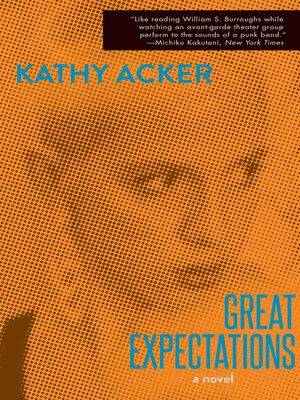
Sign up to save your library
With an OverDrive account, you can save your favorite libraries for at-a-glance information about availability. Find out more about OverDrive accounts.
Find this title in Libby, the library reading app by OverDrive.



Search for a digital library with this title
Title found at these libraries:
| Library Name | Distance |
|---|---|
| Loading... |
The author of Empire of the Senseless gives the Dickens classic a punk twist, setting it in 1980s New York City.
Kathy Acker's practice of literary appropriation and pastiche made her notorious—as a rebel and a groundbreaker—when Great Expectations was first published in 1982. Here, she begins rewriting Charles Dickens's classic—splicing it with passages from Pierre Guyotat's sexually violent Eden, Eden, Eden, among other texts—alongside Acker's trademark pithy dialogue, as well as prank missives to the likes of Susan Sontag, Sylvère Lotringer, and God.
At the center of this form-shifting narrative, Acker's protagonist collects an inheritance following her mother's suicide, which compels her to revisit and reinterpret traumatic scenes from the past. Switching perspectives, identities, genders, and centuries, the speaker lustily ransacks world literature to celebrate and challenge the discourse around art, love, life, and death.
Praise for Great Expectations
"Great Expectations in its boisterousness and strong language and sense of the injustice-of-it-all is closely related to Henry Miller." —Carolyn See, Los Angeles Times
"Acker's most accomplished experimental work. . . . As she says in Great Expectations, "a narrative is an emotional moving." It should be, but she's one of the few people . . . who manage to blend that kind of warmth, gutsiness, and skill." —Sally O'Driscoll, Village Voice
"[Acker's] most completely unified work of art. . . . One that by its formal concentration and its unified shape at every depth of reading fulfills the sort of demands that Sterne or Canetti makes of the novelist." —Alain Robbe-Grillet
"A postmodern Colette with echoes of Cleland's Fanny Hill." —William S. Burroughs
Kathy Acker's practice of literary appropriation and pastiche made her notorious—as a rebel and a groundbreaker—when Great Expectations was first published in 1982. Here, she begins rewriting Charles Dickens's classic—splicing it with passages from Pierre Guyotat's sexually violent Eden, Eden, Eden, among other texts—alongside Acker's trademark pithy dialogue, as well as prank missives to the likes of Susan Sontag, Sylvère Lotringer, and God.
At the center of this form-shifting narrative, Acker's protagonist collects an inheritance following her mother's suicide, which compels her to revisit and reinterpret traumatic scenes from the past. Switching perspectives, identities, genders, and centuries, the speaker lustily ransacks world literature to celebrate and challenge the discourse around art, love, life, and death.
Praise for Great Expectations
"Great Expectations in its boisterousness and strong language and sense of the injustice-of-it-all is closely related to Henry Miller." —Carolyn See, Los Angeles Times
"Acker's most accomplished experimental work. . . . As she says in Great Expectations, "a narrative is an emotional moving." It should be, but she's one of the few people . . . who manage to blend that kind of warmth, gutsiness, and skill." —Sally O'Driscoll, Village Voice
"[Acker's] most completely unified work of art. . . . One that by its formal concentration and its unified shape at every depth of reading fulfills the sort of demands that Sterne or Canetti makes of the novelist." —Alain Robbe-Grillet
"A postmodern Colette with echoes of Cleland's Fanny Hill." —William S. Burroughs







